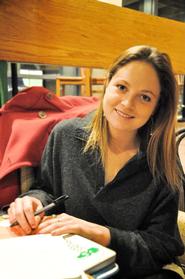
Adriana Fracchia ’14 spent last summer in Pachio Amos, Greece, assisting in an archaeological excavation and producing topographical maps of the site, an ancient village on the island of Crete.
During her time in Greece, Fracchia and John McEnroe, the John and Anne Fischer Professor of Fine Arts, frequently passed a building displaying flags and posters for the Golden Dawn, a right wing extremist political group. McEnroe informed her about the organization and its controversial actions, igniting her interest in researching the party.
This summer, with funding from the Arthur Levitt Public Affairs Center, Fracchia decided to study the rising power of the Golden Dawn, which currently holds only seven percent of the Greek popular vote. With a world politics concentration, Fracchia has an anthropological interest in the topic and believes it is important to understand why people have begun to support the Golden Dawn.
The political party positions are extremely anti-immigration, anti-corruption, and anti-foreign currency. Golden Dawn members have been involved in many hate crimes against ethnic minorities, political opponents and immigrants. While they reject the labels, they are also believed to hold neo-Nazi and ultranationalist ideologies.
With the slogans “Blood, Honor, Golden Dawn,” and “Greece for Greeks,” the Golden Dawn makes its nationalistic sentiments obvious. The openly racist organization began in 1980 with roughly 40 members, registered as a political party in 1993 and has since become third most powerful party in Greece. Under the direction of Alan Cafruny, the Henry Platt Bristol Professor of International Affairs, Fracchia is researching what triggered this growth in popular support for Golden Dawn and whether or not the organization will continue to grow in the future.
Fracchia said “the Golden Dawn is channeling misplaced anger and using the economic downturn to gain political power.” Greece’s two main industries, tourism and shipping, depend on steady global markets to remain profitable. The structural vulnerability of Greece’s economy, coupled with the questionable spending decisions of policymakers, compounded the financial losses Greece has endured since the Eurozone crisis struck.
The Greek population “believes it [the crisis] occurred because of decisions made by a select few in a corrupt government,” Fracchia claimed and added, “they know it occurred because the government essentially went on a shopping spree [that] they couldn’t afford and other European economic advisors permitted.” Rather than trying to reform the broken political system, many Greeks and members of Golden Dawn, in particular, have attacked illegal immigrants for supposedly stealing jobs and causing Greece’s economic demise.
Due to its large borders, Greece has faced challenges with illegal immigration for decades. This lengthy period of immigration refutes the Golden Dawn’s argument that immigrants have created Greece’s recent economic troubles. Citizens also did not dispute the government’s decision to employ illegal immigrants and complete the 2004 Olympic venues when construction fell behind schedule.
Fracchia said, “if you ask a Golden Dawn member why they’re in power, most will say it’s to battle illegal immigration along with some other nationalistic cry for Greece to stay Greek.” However, Fracchia doesn’t think the idea of immigrants filling Greek’s jobs is the real source of anger, and she is “trying to determine where the anger directed toward immigrants is really coming from.”
A source of contention, the Euro replaced the drachma and is viewed by Greeks as harmful to their economic well-being. Fracchia began her research with a comprehensive literature review focused on the Euro and the impact of its introduction.
She then traveled to Athens and interviewed journalists, bankers, professors and other shop owners about the existing political system. Many citizens weren’t interested in discussing politics and believe their opinions have no effect on the government’s behavior. This made finding participants willing to speak difficult. The rest of her research went according to plan, and Fracchia is now writing a detailed report on her findings.
Fracchia did not get the chance to interview Golden Dawn members, as the organization that helped her arrange interviews in Greece did not want to legitimize the party’s cause and allow their voices to be heard. She believes the party will not gain significantly more support and hopes the Greek political system will eventually address its citizens’ demands and fundamental needs.
Fracchia is a graduate of Millbrook School (N.Y.).
Posted August 21, 2013
